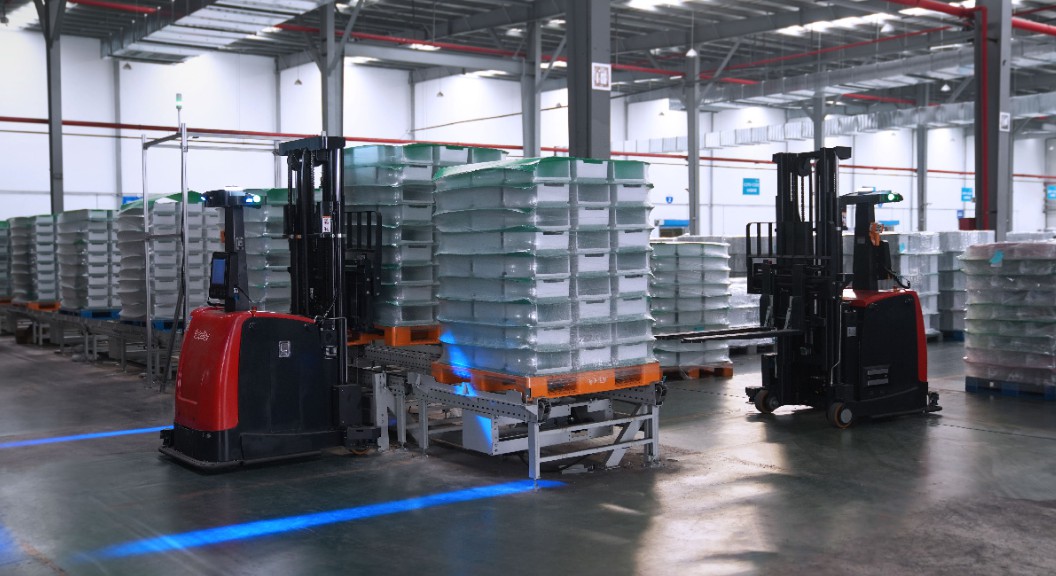
The intelligent era has brought intelligent manufacturing to a hot topic. The intelligent forklift which is closely related to intelligent manufacturing and solves the problem of repeated handling has come to the public. The main equipment and tools of industrial logistics automation for intelligent forklift operation are mainly used to replace manual repetitive handling. With its implementation and application, it has greatly promoted the pace of intelligent transformation and upgrading of enterprises. On the one hand, it has solved the needs of customers for handling, on the other hand, it can also improve the space utilization rate and various costs. Since the intelligent forklift entered the market, the market demand and sales have been rising, but in the huge market of traditional manual forklift, the growth is only slight. When many enterprises around are still traditional transportation, some decision-makers with the sense of development and transformation have to ask new questions, do enterprises really need to buy intelligent forklifts? This is also a problem that the unmanned forklift manufacturer - Future Robot wants to discuss with you today. Next, I will use four questions to comprehensively analyze this problem.
Does the enterprise need intelligent forklift? When discussing this issue, it is necessary for us to eliminate the cost of purchasing intelligent forklifts and other complex factors, and only see from an objective perspective whether the problems and challenges faced by enterprises today can be solved through automatic transformation
1. The market competitiveness is high, and the cost of labor and materials is rising. Enterprises need new ways to reduce costs.
2. Reduce damage rate and improve product quality.
3. It is difficult to recruit workers in the market and fill the gap of a large number of repetitive labor.
4. The demand for products in the market is changing rapidly, and more flexible production is needed.
5. The stability and reliability of temporary employees are poor, or it takes a lot of time to train skilled workers.
6. The working machinery is mindless and repetitive or the operation is dangerous, threatening the health and safety of employees.

The intelligent era has brought intelligent manufacturing to a hot topic. The intelligent forklift which is closely related to intelligent manufacturing and solves the problem of repeated handling has come to the public. The main equipment and tools of industrial logistics automation for intelligent forklift operation are mainly used to replace manual repetitive handling. With its implementation and application, it has greatly promoted the pace of intelligent transformation and upgrading of enterprises. On the one hand, it has solved the needs of customers for handling, on the other hand, it can also improve the space utilization rate and various costs. Since the intelligent forklift entered the market, the market demand and sales have been rising, but in the huge market of traditional manual forklift, the growth is only slight. When many enterprises around are still traditional transportation, some decision-makers with the sense of development and transformation have to ask new questions, do enterprises really need to buy intelligent forklifts? This is also a problem that the unmanned forklift manufacturer - Future Robot wants to discuss with you today. Next, I will use four questions to comprehensively analyze this problem.
Does the enterprise need intelligent forklift? When discussing this issue, it is necessary for us to eliminate the cost of purchasing intelligent forklifts and other complex factors, and only see from an objective perspective whether the problems and challenges faced by enterprises today can be solved through automatic transformation
1. The market competitiveness is high, and the cost of labor and materials is rising. Enterprises need new ways to reduce costs.
2. Reduce damage rate and improve product quality.
3. It is difficult to recruit workers in the market and fill the gap of a large number of repetitive labor.
4. The demand for products in the market is changing rapidly, and more flexible production is needed.
5. The stability and reliability of temporary employees are poor, or it takes a lot of time to train skilled workers.
6. The working machinery is mindless and repetitive or the operation is dangerous, threatening the health and safety of employees.